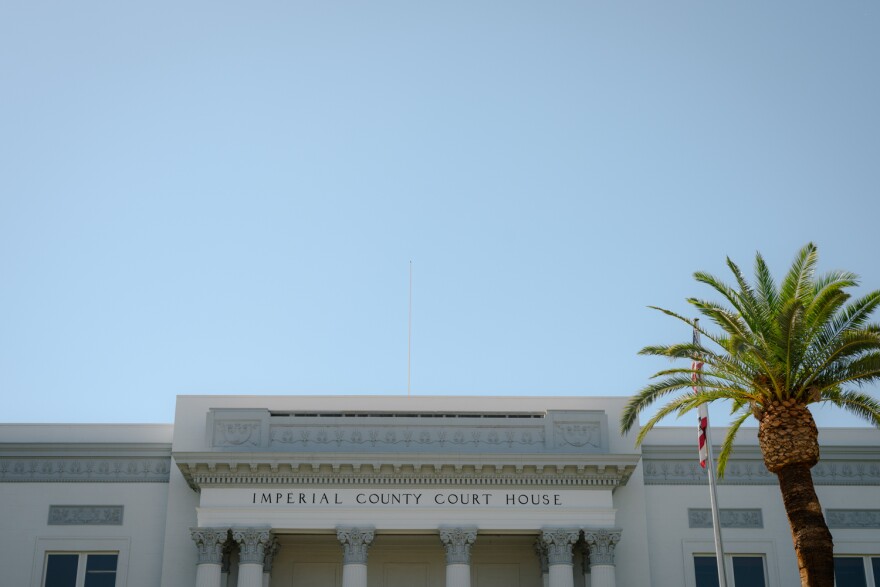Court hearings are under way in a lawsuit challenging one of the Imperial Valley’s first lithium projects.
Two environmental justice organizations are suing Imperial County officials over their decision to greenlight the Hell’s Kitchen Project, a geothermal energy plant that would collect dissolved lithium particles from searing hot water deep below the valley.
The project is being built by Controlled Thermal Resources, one of several energy companies racing to set up lithium operations near the Salton Sea and tap into the region’s massive underground lithium reserves.
But the environmental organizations Comite Civico del Valle and Earthworks say county officials didn’t look hard enough at how much water the plant would use, whether it would pollute the valley’s air and how it could affect tribal cultural resources.
Those alleged failures, they say, violated the state’s landmark environmental law, the California Environmental Quality Act. Last week, the case went before a judge for an initial hearing at the Imperial County Superior Courthouse in El Centro.
Comite Civico Executive Director Luis Olmedo said his organization supports the lithium industry. But he said Imperial Valley residents need guarantees that projects won’t pollute the air or make life harder in other ways.
“Our goal is never to say, ‘We don’t want you here,’” Olmedo said. “Our goal is to say, 'Do it right.’”
A county of Imperial spokesperson declined to comment on the ongoing lawsuit. Controlled Thermal Resources did not respond to a request for comment.
The emerging lithium industry
The court hearing comes amid an ongoing debate over the emerging lithium industry in the Imperial Valley.
Around the world, demand for lithium is surging. That’s because the metal is a key element in electric cars and other battery technology crucial to the fight against the climate crisis.
In California, more than a third of the state’s carbon emissions comes from cars and other forms of transportation, according to the state air resources board. Gov. Gavin Newsom has ordered the state to stop selling gas-powered vehicles within the next decade.
The Imperial Valley is in a strong position to help meet those electric vehicle needs. State and federal analyses have found vast amounts of lithium in Imperial County — enough to support hundreds of millions of car batteries by some estimates.
Many residents agree that the lithium industry could mean a lot to the valley. The region is one of California’s poorest counties. It’s also dealing with several climate-related disasters, including extreme heat waves and the vanishing Salton Sea.
But some advocates, including Comite Civico and Earthworks, still have concerns about how lithium operations could affect the valley.
“Lithium is important for the transition away from fossil fuels, but extracting it has serious negative environmental and social impacts that need to be addressed,” said Jared Naimark, California mining organizer with Earthworks, in a statement earlier this year.

Environmental justice advocates’ concerns
In their lawsuit, the environmental justice advocates raise several questions about the county’s environmental analysis of the Hell’s Kitchen Project.
One of their worries is that the analysis doesn’t account for how much water the lithium industry plans to use. The Imperial Valley’s entire water supply comes from the Colorado River to the east and eventually drains into the Salton Sea.
The combined water needs of future lithium projects, the suit says, would choke off part of those flows feeding into the sea and cause it to dry up faster. That could speed up the release of pesticides and other harmful chemicals from the exposed lakebed.
Over the last five years, researchers at the University of Southern California have found that children who live in towns along the lake are more likely to have asthma or other respiratory health issues.
The environmental groups’ lawsuit also argues that the county made big assumptions about how the Hell’s Kitchen Project would operate, including that the company would use all-electric vehicles to transport the lithium and would avoid creating waste by selling off any byproducts.
Comite Civico and Earthworks say the county has little evidence to back up those claims.
Finally, the environmental justice groups said the county didn’t do enough to identify tribal resources in the area and consider concerns brought by leaders from the Kwaaymii Laguna Band of Indians and the Fort Yuma Quechan Indian Tribe.
“We are making sure that the community is aware that they're not coming into these negotiations empty-handed,” Olmedo said. “We have water that has value. We have air that has value. We have public lands that have value. And the minerals under the earth — they have public value, too.”





